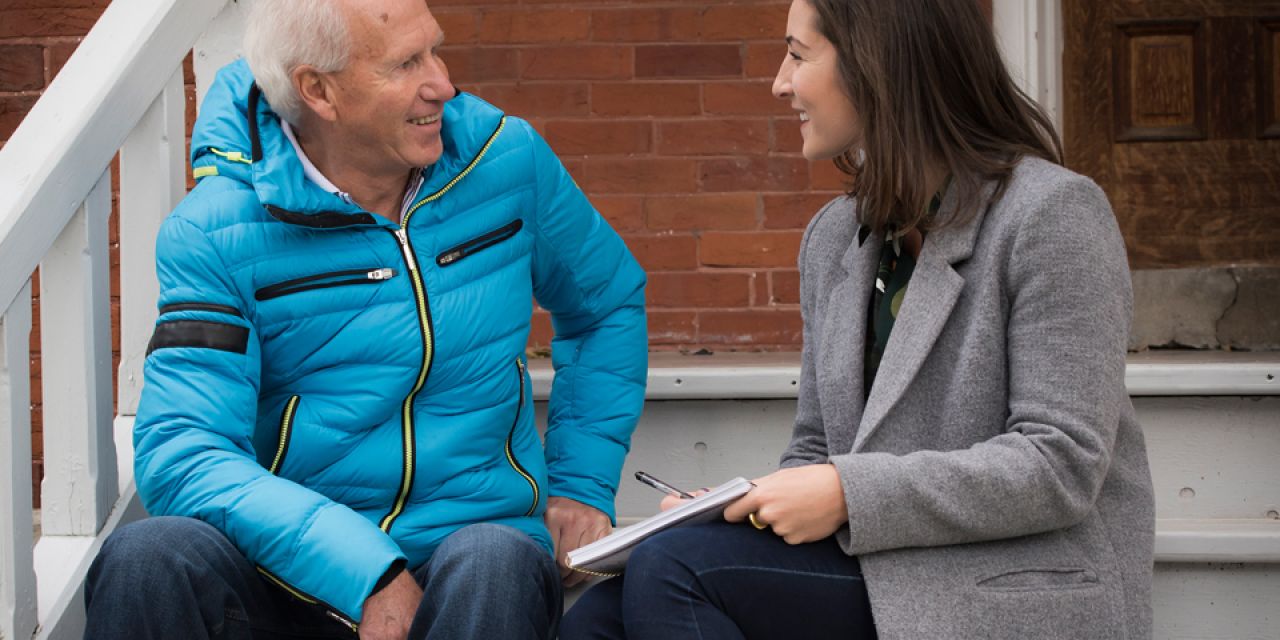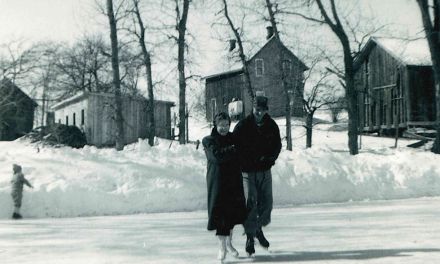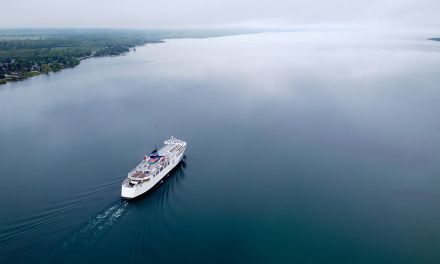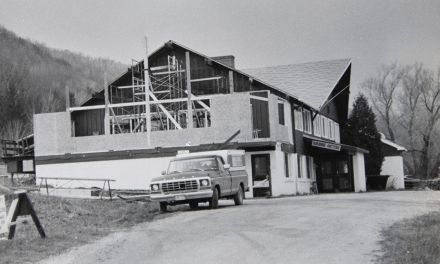In conversation | winter 2017 with Jurg Gfeller written by Larisa Yurkiw
I was born and raised in Owen Sound, which has great tobogganing, but if your goal is to tuck down a mountain going 140km/h, it’s best to travel outside the city limits. At the age of 14 my parents bought me a book of Greyhound bus tickets and soon thereafter I became a regular on the 7am bus to Collingwood to train with the National Ski Academy (NSA). Each day NSA Director and Coach Jurg Gfeller would collect me alongside HWY 26, and after a good day of work I would take the bus home to eat dinner, collapse in bed, wake up and do it all again. Two years later, I earned the opportunity to ski for Canada and in the spring of 2016, after 10 years on the World Cup circuit, I retired—ranked 3rd in the world. I owe a lot of my success to Jurg and the coaches and staff at the NSA.
This past fall the National Ski Academy celebrated 30 years—Jurg is a founding member and has been the NSA Director since 1986. Prior to the NSA, Jurg coached the Canadian National Men’s Ski Team at the World Cup level, World Championships and Olympic Winter games. Due in part to Jurg’s many years at the helm of the NSA, it has become one of the top ski academies in North America, with a half-dozen athletes making it to the Canadian National Ski Team. Jurg’s priority at the NSA has always been to provide a balance of freedom and structure to students who wish to pursue their love for skiing while attaining the academics requirements to be fully prepared for ‘life after skiing’. My time with the NSA was short-lived, at just two seasons—however I return monthly to visit with Jurg. I recently sat down with Jurg —we managed to stop teasing each other about Swiss food long enough to get an actual conversation down on paper.
Larisa: How and what sparked the flame that led to the creation of the National Ski Academy?
Jurg: It came about when I realized that we were really in need of having a program centered around athletes, but also to address the needs of the students in all areas. That means academically (well-rounded, with a good education), athletically (pursuing their sport and passion), physically (physical fitness level and lifestyle), mentally (to be prepared for challenges of all kinds) and socially (fun, friend-filled environment and family involvement). For us, it became obvious that we need to give them those tools. The goal was for them to learn and have success while pursuing the desire to go as far as they can.
We’re, geographically, not necessarily the best area [for ski racing] but we have had great community support and people behind us. When we opened the school, we solved a problem for a lot of families who were losing valuable time commuting for school, skiing, dry land, family time, etc. It became a big burden for the entire family simply to give the kid the opportunities. Therefore, it was very easy to look at it seriously and say, “If we could put something together which places and maintains the athlete at the forefront, that would be a good thing.”
Larisa: I agree that geographically the Escarpment might not have the obvious advantages of larger mountains yet we’ve put a lot of people on the world stage of skiing. Why do you think this area still has so much to offer even if there are much bigger, steeper options out there?
Jurg: Obviously, one thing that always comes to mind is that we have a huge population base. To me that was a big thing. In addition, we have a great number of ski clubs doing an excellent job with grassroots programs and families support their kids to pursue these opportunities. Naturally, once you put those two things together, you will get some success in athletes from this area.
Larisa: In your experience (and you have a lot of experience), what trends and challenges have you seen over the last 30 years?
Jurg: When I look back over 30 years at the first kids who came through this academy, I believe the demands and the commitment of the students, athletes and families has increased drastically.
Larisa: Are you saying that all those years ago, when I was here, I wasn’t committed?
Jurg: No, I’m not saying that. (Laughter and off-the-record distracted chat ensues.)
Today, when you look at the world stage, intensity has increased on so many levels. Things have become more scientific, time-invested is growing and the pressure we put on these kids… we have tried to condense. By losing grade 13 in school and adding U16 (under 16 years of age category), the bigger picture now gives athletes two years in FIS [the competition platform for ski racers around the world] to prove themselves.
This is a very condensed window compared to earlier days when the kids had four or five years to find themselves, learn and mature. The changes were sudden but the expectations remained. Over the last 30 years, the demands have really changed. Lastly, I think also the cost to the family is ever rising to pursue any sport at higher levels.
Larisa: You mentioned a two-year window that is short yet intense, to develop boys and girls into men and women. What do you think happens under the NSA roof that allows the students to achieve success, inside and outside the sport?
Jurg: For us, it’s based on life skills and preparing student athletes on their journey for what may come afterwards. This is just as important to us. We have kids coming in at an earlier age (13/14 years old) leaving at 17/18 years old so we have them for a three to five year window and all we really want to say with that window is, “We can help you, we can guide you, we can put the environment around you and try to give you the tools necessary to learn, to have certain success, to master the challenges. If we do all that, it prepares you for the most important part… the life that comes after.”
Larisa: As many NSA alums will attest, you continually go above and beyond the traditional Coach/Director call of duty. You have the incredible ability to cater to the personal/human side of the job–taking an interest in the student athletes; helping them through times of hardship and doubt. Myself included. Where did your passion to help young people become stronger versions of themselves, comes from?
Jurg: I think the passion for skiing came from my own family and my parents’ influence. But it also came from my own experiences. I tried to ski race and I saw some individuals (coaches, teachers, parents) who really were behind me. It showed me that if I could help to positively affect kids like that in the future then I really wanted to pursue that. It’s a privilege and absolutely extraordinary to be involved in a kid’s journey and their lifestyle, to play a role in helping them prepare for life, giving them certain skills to master the challenges. Seeing their confidence improve when they experience success, seeing their personal growth when reaching their potential… this is what it’s all about.
Over 30 years, I get to see where the athletes are now and it’s extremely gratifying. The environment here helped them make lifelong friendships. They were honest with each other, they were respectful to each other and they strived together. They take those friendships with them forever
Larisa: I’m aware of this lifelong bond to the Academy. I have completely worn out the seat cushion in your office over the years from bouncing thousands of ideas (and emotions) off you.
Jurg: Ja, now we have to fix it.
Larisa: You have a clear heartfelt love for the sport and for the athletes who come in contact with you. As I know too well, there are many ups and downs in an athlete’s career and we need guidance and a strong leader to help us through the good and the bad. What would you say is the most important skill for a Coach to possess?
Jurg: First of all, I learned to be a very good listener. That goes a long way. Secondly, you have to put the person you’re dealing with at the forefront. They are number one and that’s why you’re listening. Thirdly, whatever their issue is, you have to be respectful to them and you have to be honest. If it comes from the heart, it goes a long way. I always tell kids, “Sometimes I can be tough on you. Sometimes I can push you. Sometimes I cannot agree with you. But, make no mistake, I care.” And if I care, it’s for the right reasons that I’m trying to help him/her be successful. They understand that and that goes well beyond this sport.
Larisa: Do you have any memories that shine brighter than the others?
Jurg: There are so many but here is one… I had an athlete who was one week into the National Championships and wanted to go home and quit. After the first day of training, the athlete was in last place. There were many tears and long walks that night. We talked about life and why adversity teaches you the best lessons. The athlete continued the next day with training and the result was a bit better. As we progressed through the week, the outcome improved step by step and a smile slowly came out. The last day of the Championships was a Giant Slalom race and the athlete won the race by one-hundredth of a second. Canadian Champion! I was very proud of the athlete and that she experienced how much there is to learn about yourself… how quickly we lose what we believe and how important our mind set is.
Larisa: You maintain a persistent model of success here and around the world with the NSA. After 30 years I understand you may be taking some time off—what are you planning to do with your time?
Jurg: I will be involved with the NSA in the future and continue helping student athletes to maximize their individual potential. If I have some extra free time I would like to travel, play golf and ski big mountains!
Larisa: See you out there! Lastly, with your Swiss heritage, I want to know where, in town, can I get the best Swiss cuisine?
Jurg: Probably at Jurg’s place! …That’s a good question. The Swiss Alphorn has great fondue and raclette and there’s a Swiss Bakery here on First Street with fresh bread every day and special treats and deserts.
Larisa: Jurg, thank you for your time and for the heart and soul you put into this town gem. The two years that I spent with you at the NSA gave me a taste of the work environment I am now searching for in my ‘retirement’. You were transparent and worked hard to provide an environment that launched me on an amazing trajectory beyond my wildest dreams. I look forward to seeing you again soon for our monthly visit 🙂 And don’t worry; I’ll replace your seat cushion one of these days.
Larisa Yurkiw is a local Olympian, born and raised in Owen Sound who grew up skiing at Georgian Peaks. Newly retired from a World Cup ski career, where she finished the 2016 season as one of the Top 3 Downhill racers in the world, she currently juggles her MBA online studies while traveling the country for corporate events and ski days, sharing her bold story of vulnerability in a fast-paced industry. www.larisaspeaks.com |E|







